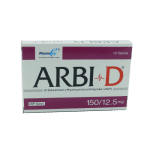delivery within 72 Hours
Arbi D 300/12.5mg Tablet
₨ 670
Generic: Irbesartan and Hydrochlorothiazide
Pack Size: 10s
Product Form: Tablet
Delivery within: 2 to 3 working days across Pakistan
Shipping & Delivery
-
Courier delivery
Our courier will deliver to the specified address
2-3 Days
From Rs 250
-
Free 15-Day returns

Black Friday Blowout!
Description
Arbi D 300/12.5mg Tablet is a combination medication comprising two active ingredients: Irbesartan and Hydrochlorothiazide. It is prescribed for the management of hypertension (high blood pressure) to help lower blood pressure and reduce the risk of cardiovascular events.
Active Ingredients:
- Irbesartan (300mg): Irbesartan belongs to a class of medications known as angiotensin II receptor blockers (ARBs). It works by blocking the action of angiotensin II, a substance in the body that causes blood vessels to constrict, thereby relaxing blood vessels and lowering blood pressure.
- Hydrochlorothiazide (12.5mg): Hydrochlorothiazide is a thiazide diuretic that works by increasing the excretion of sodium and water from the body through the kidneys, leading to a reduction in blood volume and blood pressure.
Uses:
Arbi D 300/12.5mg Tablet is indicated for the treatment of hypertension (high blood pressure) in patients who require multiple antihypertensive agents to achieve adequate blood pressure control.
How it Works:
Each component of Arbi D 300/12.5mg Tablet works through different mechanisms to lower blood pressure:
- Irbesartan blocks the effects of angiotensin II, leading to vasodilation and decreased blood pressure.
- Hydrochlorothiazide increases the excretion of sodium and water, reducing blood volume and blood pressure.
Dosage and Administration:
- The dosage of Arbi D 300/12.5mg Tablet should be determined by a healthcare provider based on individual patient factors, including blood pressure goals and response to treatment.
- It is usually taken orally once daily with or without food.
- Swallow the tablet whole with a glass of water. Do not crush, chew, or break the tablet before swallowing.
Side Effects:
Common side effects of Arbi D 300/12.5mg Tablet may include:
- Dizziness
- Headache
- Fatigue
- Hypotension (low blood pressure)
- Increased urination
- Electrolyte imbalances
Serious side effects such as allergic reactions, electrolyte abnormalities, or kidney problems may occur rarely but require immediate medical attention.
Precautions:
- Before taking Arbi D 300/12.5mg Tablet, inform the healthcare provider about any pre-existing medical conditions, allergies, or medications being taken.
- Use caution in patients with kidney or liver impairment.
- Regular monitoring of blood pressure, kidney function, and electrolyte levels is recommended during treatment with Arbi D 300/12.5mg Tablet.
FAQs:
- How long does it take for Arbi D 300/12.5mg Tablet to lower blood pressure? The onset of action of Arbi D 300/12.5mg Tablet varies depending on individual patient factors and the severity of hypertension. Improvement in blood pressure control may be observed within a few weeks of starting treatment, but it is essential to continue taking the medication as prescribed to maintain blood pressure goals.
- Can Arbi D 300/12.5mg Tablet be used during pregnancy or breastfeeding? Arbi D 300/12.5mg Tablet is not recommended for use during pregnancy or breastfeeding due to the potential risk of harm to the fetus or nursing infant. Pregnant or breastfeeding women should consult a healthcare provider for alternative treatment options.
- What should I do if I miss a dose of Arbi D 300/12.5mg Tablet? If a dose is missed, take it as soon as remembered, unless it is close to the time of the next scheduled dose. In that case, skip the missed dose and resume the regular dosing schedule. Do not double the dose to catch up.
- Can Arbi D 300/12.5mg Tablet be taken with food or other medications? Arbi D 300/12.5mg Tablet can be taken with or without food. However, it is essential to avoid taking it with high-sodium foods or other medications that may interact with hydrochlorothiazide without consulting a healthcare provider.
- Is Arbi D 300/12.5mg Tablet suitable for elderly patients? Arbi D 300/12.5mg Tablet can be used in elderly patients with hypertension, but dosage adjustments may be necessary based on individual patient factors such as renal function and tolerance to the medication. Regular monitoring is recommended to assess treatment response and potential adverse effects.
Customer Reviews
You must be logged in to post a review.










Reviews
Clear filtersThere are no reviews yet.